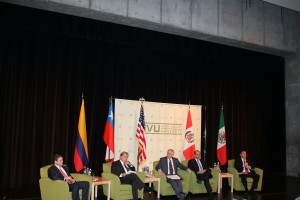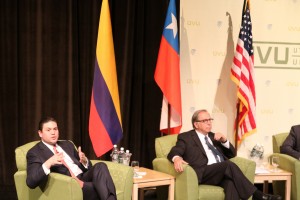
Utah Valley University hosted the ambassadors of Colombia, Peru, Chile, and the consul general of Mexico Thursday for a lecture in the Sorensen Center. These four dignitaries, representing the Pacific Alliance, spoke on a variety of topics including economic growth, commercial integration and future growth.
The lecture was moderated by Lew Cramer, a former U.S. trade advisor and an advocate of free trade. The ambassadors spoke warmly of their experience in Utah and praised their relationship with the United States.
“The state of Utah is remarkable for teaching students languages and encouraging students to visit our countries,” said Juan Valdés, ambassador of Chile. “It is not easy to find an audience that has been to and had experiences in our countries.”
The representatives stated their nations’ shared histories of rising from corruption and violence to stability, peace and prosperity.
“It used to be that when you thought of my country, it was of brutality and killings,” said Carlos Pinzón, ambassador of Colombia. “Stabilizing Colombia was a political priority. We now have the lowest homicide rate in almost 40 years. Sound management of the economy has reduced poverty and stabilized the economy.”
This sentiment, voiced by the other ambassadors as well, led to the formation of the Pacific Alliance in 2011. The four countries, with the support of additional nations, united to promote regional integration, trade cooperation, and the reduce socioeconomic inequality pervasive to the area.
Valdés cited economic instability in the E.U. and in Pacific Asia as “not bright and luminous,” then related reasons for the necessity of a strong Latin American coalition, a point which the other diplomats echoed as well.

“We need to harmonize relations,” said Miguel Castilla, ambassador of Peru and current leader of the Pacific Alliance. “This is not competing, but the natural convergence of common policies. This is a natural economic process of evolution.”
The four Latin American ambassadors also focused on other, non-trade issues.
“In the Alliance, we are looking for the free movement of ideas, goods, services, and people,” said Eduardo Palomera, consul general of Mexico. “We are opening shared diplomatic offices and have given more than 1,000 scholarships in the last three years.”
The Alliance plans to spend the next year focusing on energy surpluses and deficits, as well as a peace agreement to be signed later in 2016. The ambassadors were uniformly excited about the future of the Pacific Alliance.
“A lot has been achieved in a short time,” Castilla said. “We know where to go from here.”




